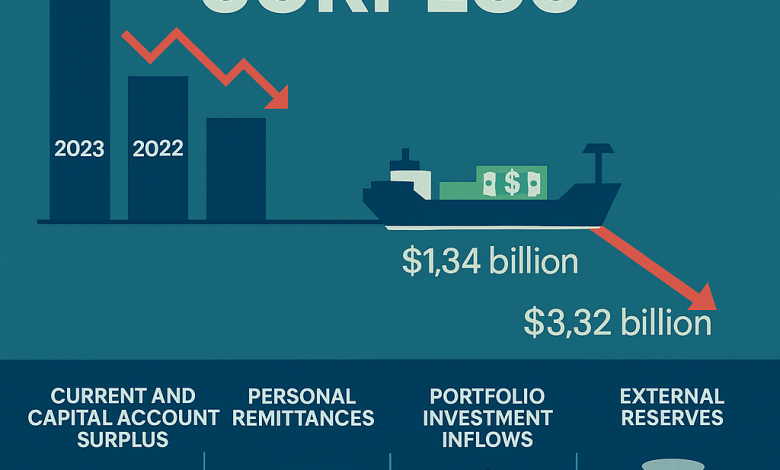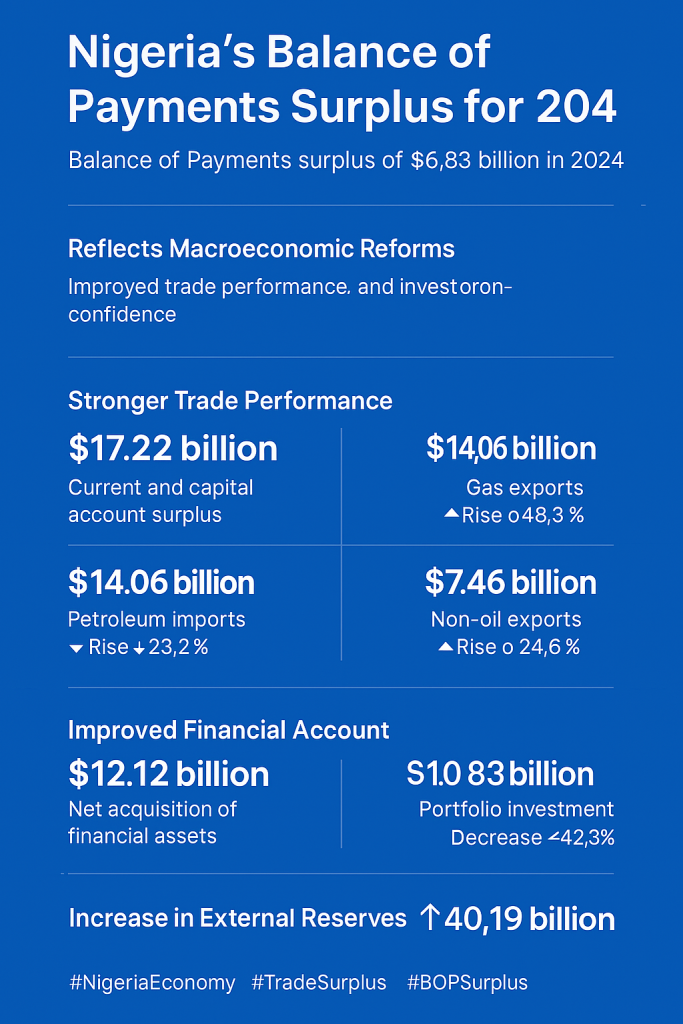Nigeria’s Balance of Payments Surplus 2024 Reflects Strong Trade Performance

By DAYO ADESULU
Nigeria’s Balance of Payments surplus in 2024 as stated by the Central Bank of Nigeria (CBN) report (yet to be sighted) highlights a substantial surplus in the country’s current and capital accounts, totaling $17.22 billion for 2024. This was largely supported by a goods trade surplus of $13.17 billion, a marked improvement from the previous year.
Key to this positive development was the decline in petroleum and non-oil imports. Petroleum imports dropped by 23.2% to $14.06 billion, while non-oil imports also decreased by 12.6% to $25.74 billion. This reflects not only reduced demand for foreign goods but also a shift toward local sourcing and production in Nigeria’s domestic economy.

On the export front, natural gas exports surged by 48.3% to $8.66 billion, while non-oil exports rose by 24.6% to $7.46 billion, indicating growing diversification in the nation’s export base.
- World Bank Urges CBN to Reassess Forex Intervention Strategies
- https://www.thecheernews.com/trump-escalates-tariffs-on-china-to-125-amid-global-trade-war-pause/
Diaspora Remittances and IMTO Inflows Boost External Finances
A major contributor to Nigeria’s Balance of Payments surplus in 2024 was a strong showing in remittances. Personal remittance inflows increased by 8.9% to $20.93 billion, while inflows from International Money Transfer Operators (IMTOs) jumped by 43.5% to $4.73 billion, up from $3.30 billion in 2023.
These figures reflect stronger engagement from the Nigerian diaspora community and a better policy environment supporting formal remittance channels. In addition, official development assistance to Nigeria rose by 6.2% to $3.37 billion, providing further support to external financing needs.
Financial Account Improves Despite Drop in FDI
The CBN also noted a sharp increase in financial assets. The country recorded net acquisition of financial assets totaling $12.12 billion in 2024. Portfolio investments led the charge, with inflows more than doubling—rising by 106.5% to $13.35 billion.
Resident foreign currency holdings rose by $5.41 billion, suggesting heightened confidence in the Naira and the broader Nigerian economy.
Despite the overall improvement, Foreign Direct Investment (FDI) fell by 42.3% to $1.08 billion. While concerning, analysts believe this could rebound as economic reforms deepen and investor perceptions continue to improve.
Nigeria’s External Reserves Rise to $40.19 Billion
Perhaps the most telling indicator of the nation’s improving external position is the rise in foreign reserves. The country’s external reserves increased by $6.0 billion, reaching $40.19 billion by the end of 2024. This increase boosts Nigeria’s external buffer and its ability to withstand external shocks, such as volatility in oil prices or global financial tightening.
The CBN stated that this improved reserve position is a direct result of effective policy management, reduced import dependency, and a healthier trade account.
Macroeconomic Reforms at the Core of Nigeria’s Balance of Payments Surplus 2024
Analysts attribute the turnaround in Nigeria’s Balance of Payments to a series of bold economic reforms initiated in early 2023 and carried into 2024. These include:
- Exchange rate unification and enhanced FX transparency
- Reforms in the oil and gas sector
- Improved infrastructure for export-oriented businesses
- Supportive diaspora and trade policies
These reforms have led to increased foreign investor participation, reduced pressure on the Naira, and better economic stability—providing a foundation for sustainable growth.
Conclusion
The $6.83 billion Balance of Payments surplus in 2024 reflects a positive shift in Nigeria’s external economic health and positions the country for stronger macroeconomic performance going forward. The CBN’s data offers hope that the era of persistent deficits could be coming to an end, thanks to improved trade performance, increased diaspora engagement, and prudent financial management.
As the country continues to attract portfolio investment and expand non-oil exports, experts expect the country’s external accounts to remain robust—laying the groundwork for sustainable economic growth.
Nigeria’s Balance of Payments Surplus 2024, how do yo think this can impact the lives of the ordinary Nigerians? Drop your comments or continue the discussion via any of the hash tages.
#NigeriaEconomy, #CBNReport, #BalanceOfPayments2024, #ForeignReserves, #TradeSurplus, #NairaStability, #DiasporaRemittances, #ExportGrowth, #EconomicReforms, #PortfolioInvestment,





